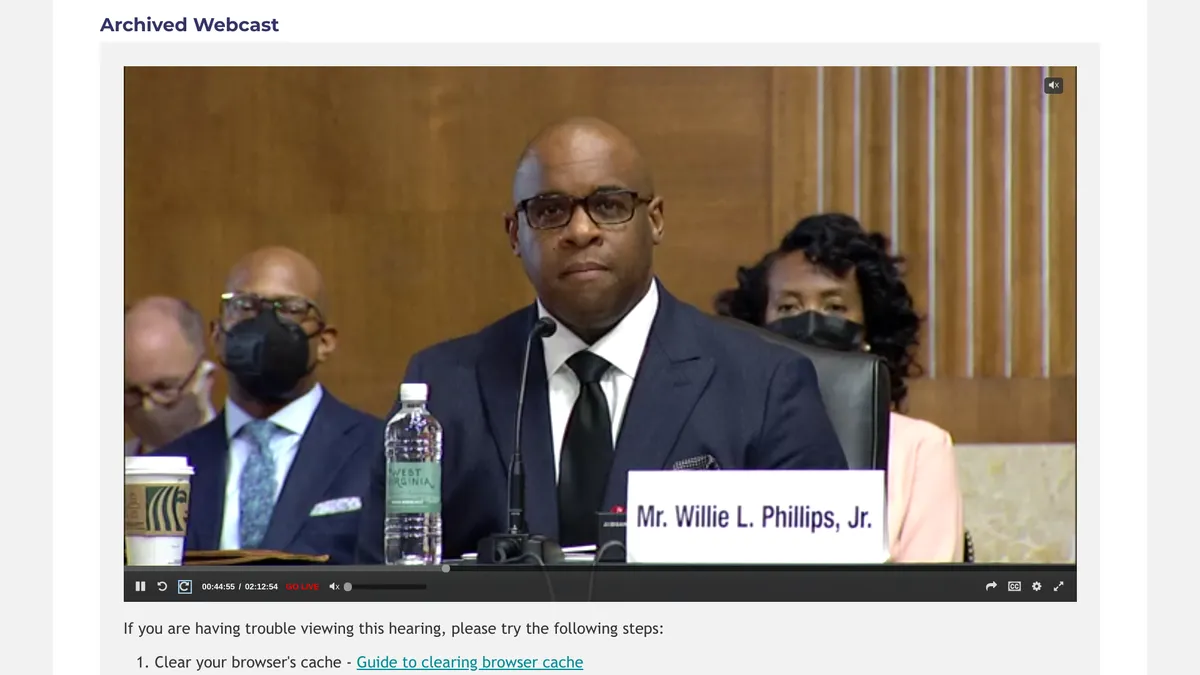UPDATE: Nov. 17, 2021: The Senate unanimously confirmed Willie Phillips Jr. Tuesday to fill a vacant seat at the Federal Energy Regulatory Commission, giving Democrats a 3-2 majority at the agency.
Adding Phillips to the agency could break potential logjams over key policy decisions. FERC is considering changing its rules around transmission planning, how it reviews natural gas infrastructure and how to give the public a bigger role in its decision-making processes. Phillips must be sworn in before he is officially seated at FERC, which oversees wholesale power markets, natural gas infrastructure and non-federal hydroelectric dams.
The Sustainable FERC Project praised the vote. “FERC needs a full bench to keep pace with the dramatic energy transformation taking place across the nation,” the advocacy group housed at the Natural Resources Defense Council said on Twitter.
Dive Brief:
-
A Senate confirmation hearing Tuesday for Federal Energy Regulatory Commission nominee Willie Phillips Jr. moved the agency a step closer to regaining five sitting commissioners.
-
Phillips, chairperson of the Public Service Commission of the District of Columbia, told the Senate Energy and Natural Resources Committee his regulatory policy is based on the three-legged stool of reliability, affordability and sustainability.
-
Having Phillips, a Democrat, at FERC could help the agency avoid deadlocks on pending issues such as transmission reforms, natural gas infrastructure reviews and the role aggregated demand response can play in wholesale markets. "FERC is at its best with a full complement of commissioners," FERC Chairman Richard Glick said Tuesday on Twitter.
Dive Insight:
At the hearing, Phillips said through his experiences — growing up in rural Alabama, attending the University of Montevallo in Alabama, studying law at Howard University, working in private practice and serving as a utility regulator — he came to believe there are three main goals of a utility commission: reliability, affordability and sustainability.
Phillips described watching his mother and grandmother do backbreaking labor, earning "barely enough to scrape by." Each month, bills would be spread across the dining room table with hopes there would be enough money to cover the expenses, he said.
"It is never far from my mind that there are those who depend upon regulators to assure that energy services are provided efficiently, at the lowest possible, reasonable rate," Phillips said.
Referring to a three-legged stool, Phillips called for using "balance" to address issues such as climate change.
"Every leg of the stool is important to the overall operation," Phillips said. "If you have world class sustainability ... and sacrifice reliability, the chair will fall. If you have wonderful sustainability, but you have gold-plated reliability, no one can afford to sit in the chair."
"I believe my approach, if I'm honored to be confirmed, would be to seek balance in everything that we do," Phillips said.
In his work at the PSC, Phillips said he tries to focus on the facts and the law to come to "reasoned, principled" decisions.
"The public interest drives the work of the commission, and as a regulator, you have to block out all the chatter and just focus on what's in front of you," Phillips said.
In response to a question about the value of U.S. energy independence from committee Chairman Joe Manchin, D-W.Va., Phillips said he supports an "all-of-the-above" strategy.
"FERC is an economic regulator, they do not pick winners and losers," Phillips said. "At the same time, I'm very aware that we're in the middle of an energy transition. I want to do everything that I can, if I'm honored to be confirmed, to push forward innovation to achieve our goals."
Sen. James Lankford, R-Okla., pressed Phillips on FERC's decision earlier this year to conduct environmental impact statements (EIS) for proposed natural gas projects that had already been issued environmental assessments. The decision to perform the EISs to more fully assess the projects' greenhouse gas emissions delayed final decisions for the proposals.
FERC must make sure its decisions are "legally durable," Phillips said. "The DC Circuit [Court of Appeals] has been clear to FERC that they have a responsibility to consider climate change and environmental justice, and this is something that, if I'm confirmed, I will also be focused on."
Pointing to a recent Department of Energy study on the value of increasing transmission capacity between the Eastern and Western interconnections, Sen. Maria Cantwell, D-Wash., asked Phillips if more should be done to connect regional grids.
"Yes, absolutely," Phillips said.
Phillips said it is "unacceptable" that some natural gas utility customers will have to spend up to 10 years paying for natural gas price spikes during a mid-February winter storm that disrupted power and gas markets across the middle of the U.S.
"What happened with winter storm Uri, it shouldn't have happened," Phillips said. There were about five days of rolling blackouts affecting millions of people across the Electric Reliability Council of Texas footprint during the storm.
Based on the questions at the hearing, Sen. Lisa Murkowski, R-Alaska, said Phillips' nomination appeared to be moving ahead smoothly.
"I'm struck that this is a pretty calm hearing, all things considered, the fact that we have a FERC nominee, we usually don't get such a calm proceeding," Murkowski said.
If approved by the Senate, Phillips would give Democrats a 3-2 majority at FERC. The agency has had two Democrats, Glick and Allison Clements, and two Republicans, James Danly and Mark Christie, since Republican Neil Chatterjee left the agency on Aug. 30.
With only four commissioners, in the last three weeks, a major change to the PJM Interconnection's capacity market and a proposal to launch a 15-minute electricity trading platform in the Southeast took effect when the commissioners split on the issues.














